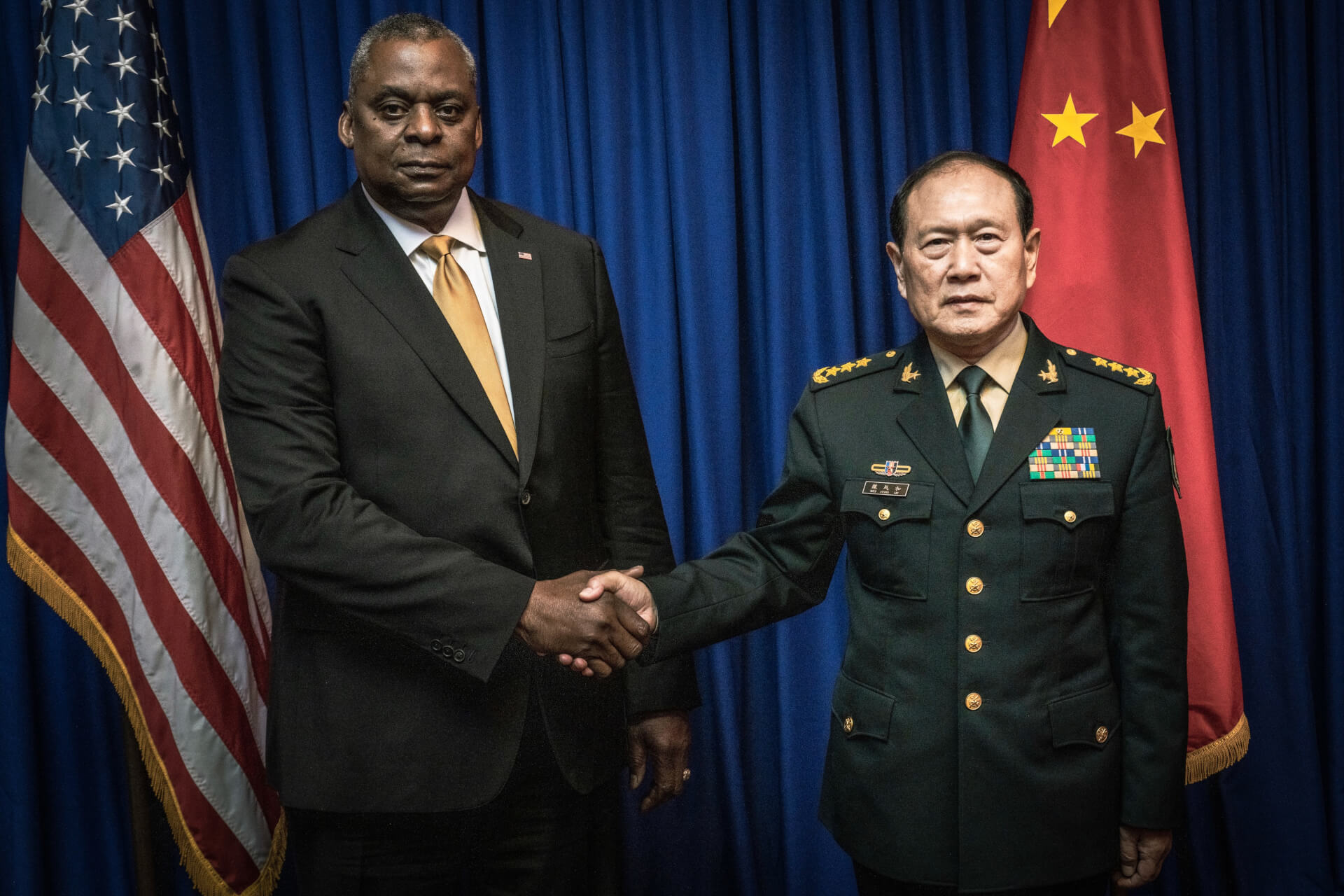During a meeting with his American counterpart Lloyd Austin on Tuesday, Chinese Minister of Defence Wei Fenghe reiterated that the United States (US) “must respect China’s core interests” and Taiwan is at its “very core.”
“The settlement of the Taiwan question is the Chinese people’s own affair, and no external force has the right to interfere. The Chinese armed forces have the backbone, resolve, confidence and capability to resolutely safeguard the national reunification,” Wei stressed during the nearly 90-minute-long meeting on the sidelines of the Association of Southeast Asia Nations (ASEAN) Defense Ministers Meeting-Plus in Siem Reap, Cambodia.
#China's SC&DM Wei Fenghe held talks with his #US counterpart #LloydAustin ystd in #Cambodia, emphasizing that the #Taiwan question is the core of China's core interests &the 1st insurmountable red line in China-US relations. pic.twitter.com/B8Q7qaa08c
— Ambassador Deng Xijun (@China2ASEAN) November 23, 2022
Austin, meanwhile, reiterated Washington’s “longstanding one China policy,” reaffirming “the importance of peace and stability across the Strait.” He also expressed “his opposition to unilateral changes to the status quo” and urged China to “refrain from further destabilising actions toward Taiwan.”
Their interaction shortly followed US President Joe Biden’s three-hour-long meeting with his Chinese counterpart Xi Jinping in Bali last week, wherein the Chinese leader warned the US that interfering in Taiwan constitutes a ‘red line’ and could lead to a “collision.” Xi noted that the present state of their relations is “not in the fundamental interest” of either country or the international community at large, saying the world stands at a “major inflexion point in history.” He thus stressed that both sides need to “explore the right way to get along with each other” and bring bilateral relations ‘back on track.’
According to a Chinese press release published after their meeting, Biden said he “does not support “Taiwan independence”, does not support “two Chinas” or “one China, one Taiwan”, and has no intention to have a conflict with China.” Equally, however, Biden has stated on a few occasions this year that US troops would defend Taiwan in the event of a Chinese invasion.
The US needs to listen to reason & drop the zero-sum mentality. pic.twitter.com/kqM2RMsT0l
— Spokesperson发言人办公室 (@MFA_China) November 22, 2022
The meeting between Wei and Austin was their first since House Speaker Nancy Pelosi’s “provocative” visit to Taiwan in August, which resulted in extensive live military drills around the self-governing island, which Beijing considers to be a part of Chinese territory. China also undertook a number of aggressive military manoeuvres and suspended various avenues of cooperation with the US and repeatedly warned of firm countermeasures.
Earlier this month, the US released its National Defense Strategy, which mainly focuses on the “need to sustain and strengthen US deterrence” against the “growing multi-domain threat posed” by China. In fact, two weeks ago, Chinese Defence Ministry spokesperson Tan Kefei condemned the US’ NDS by saying that it “smears China’s normal military development on the excuse of planning the US defense strategy.”
“We urge the US side to abandon the Cold War zero-sum mentality, banish preconceptions and stereotypes about China, correct its wrong perception of China, view the development of China and its armed forces rationally, adopt an objective and pragmatic attitude, and do more things conducive to maintaining world and regional peace and stability,” Kefei underscored.
Taiwan at core of #China's interests, with one-China principle to be respected by US: spokesmanhttps://t.co/GC6nlK0czX pic.twitter.com/2OKE8fGClP
— CCTV+ (@CCTV_Plus) November 23, 2022
Similarly, defence chief Wei emphasised that the responsibility for the current deterioration of US-China relations “lies with the US, not with China.” Following the meeting, Kefei told reporters that China felt that the US’ “wrong strategic judgment” led to a complete shutdown of dialogue.
In this regard, Wei expressed hope that Washington “will keep its word, honour its commitment, truly implement the consensus reached by the two heads of state, and adopt a rational and pragmatic China policy, so as to bring China-US relations back to the track of steady and sound development.”
According to the Chinese press release, both parties agreed to “maintain communication and contact, strengthen crisis management and control, and strive to maintain regional security and stability.”
This morning, I met with PRC Minister of National Defense General Wei Fenghe while attending the ASEAN Defense Ministers Meeting. We discussed U.S.-PRC defense relations, as well as regional and global security issues. https://t.co/DwBsdkZE5s
— Secretary of Defense Lloyd J. Austin III (@SecDef) November 22, 2022
Austin, on the other hand, raised concerns about the “increasingly dangerous behaviour” demonstrated by the Chinese military aircraft in the Indo-Pacific, which he said “increases the risk of an accident.” He affirmed that Washington “will continue to fly, sail, and operate wherever international law allows.”
His comments came in response to the Chinese People’s Liberation Army (PLA) condemning the US-Canada joint mission in the Taiwan Strait in September. The PLA said its forces had “warned” the ships and scrambled its air and naval forces “to track and monitor the US and Canadian warships in the whole course.”
In this regard, Deputy Pentagon Press Secretary Sabrina Singh underscored during a press briefing on Tuesday that the US is “going to continue to sail, operate and fly in open waters and international waters.”
As per the US Department of Defense readout, both sides opposed the “use of nuclear weapons or threats to use them” in the ongoing Russian invasion of Ukraine. Furthermore, in light of China’s continued opposition to new sanctions against North Korea, Austin urged China to “fully enforce existing UN. Security Council resolutions regarding [North Korea’s] unlawful weapons programs.”

